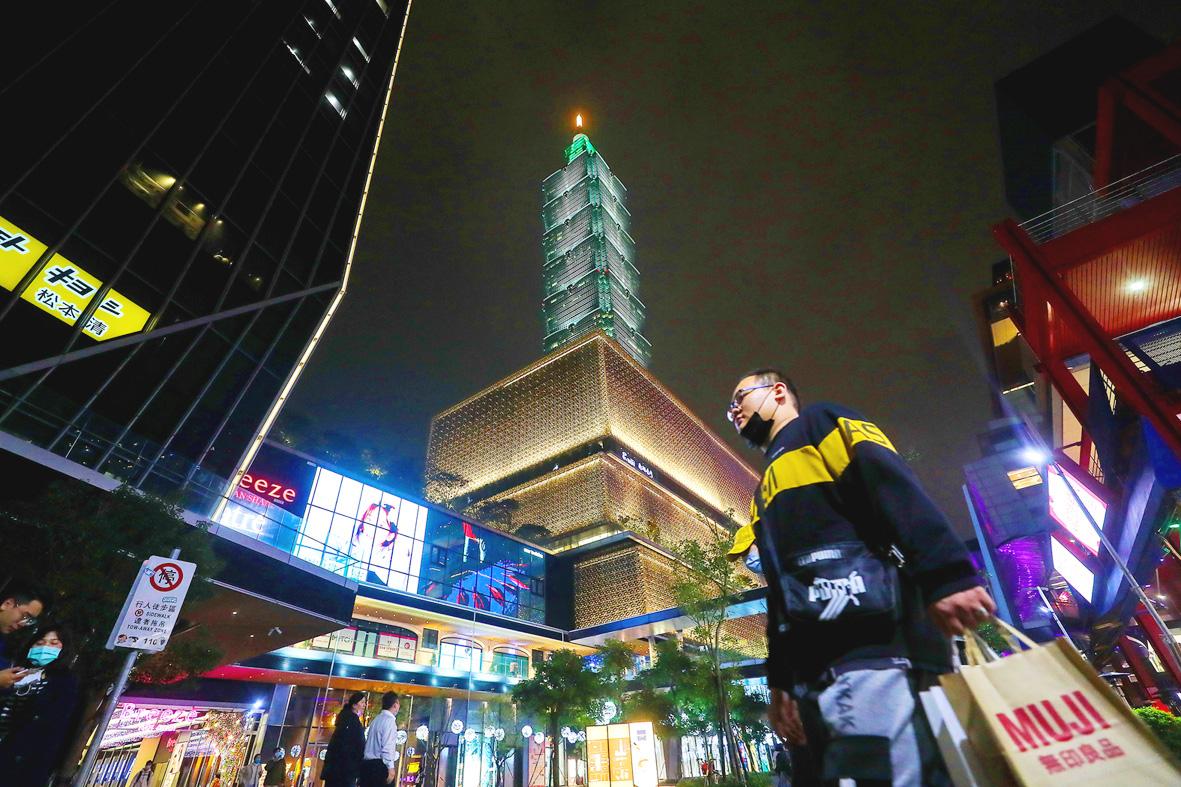Taiwan’s economy ranked sixth in this year’s Index of Economic Freedom, as its overall score picked up 1.5 points due primarily to an improvement in government integrity, an annual Heritage Foundation survey released yesterday showed.
The nation ranked 11th in last year’s edition of the survey.
The US think tank measures 12 freedoms, from property rights to financial freedom, grouped into four categories: rule of law; government integrity; judicial effectiveness; and regulatory efficiency and open market.

Photo: CNA
Taiwan was fourth among 40 economies in the Asia–Pacific region after Singapore, New Zealand and Australia, with an overall score of 78.6, above the regional and world averages, the survey showed.
Taiwan’s economy put up its best performance in the survey’s 27-year history, inching closer to the ranks of the free than ever before, it said.
The main factor holding Taiwan from the top economic freedom category remains a relative lack of labor freedom, it said, adding that the government raised the minimum wage again last year, despite the possibility of damage to productivity and flexibility for workers.
As of December last year, Taiwan reported only seven deaths related to the COVID-19 pandemic, which the survey called a remarkably low figure, compared with fatalities in other economies.
Taiwan’s trade-dependent economy is driven by a competitive manufacturing sector that encompasses electronics, machinery, petrochemicals, and information and communication technology products, it said.
Taiwan’s business freedom is among the highest at 93.4, and has ranked above 90 year since 2013, it said.
However, the nation’s workforce is shrinking with an aging population and there is also a shortage of blue-collar manufacturing workers, it said.
The government provides research and development grants to encourage local high-tech firms to forge partnerships with foreign companies, it said.
Taiwan has six preferential trade agreements and 380 non-tariff measures with average tariff rates standing at 2 percent, the report said, adding that some agricultural imports face additional barriers.
The nation also has a well-developed investment framework that facilitates the flow of goods and capital, it said.
The financial sector continues to evolve and expand, and the stock market is open to foreign participation.
Interests in property are protected, and the system for recording mortgages and liens is reliable, it said.
While corruption is much less prevalent today, it remains a problem, especially because politics and big business are closely intertwined, the foundation said.
The top individual income tax rate is 40 percent and the top corporate tax rate is 20 percent, while the overall tax burden equals 8.9 percent of total domestic income and public debt is equivalent to 28.2 percent of GDP, it said.

The Central Election Commission has amended election and recall regulations to require elected office candidates to provide proof that they have no Chinese citizenship, a Cabinet report said. The commission on Oct. 29 last year revised the Measures for the Permission of Family-based Residence, Long-term Residence and Settlement of People from the Mainland Area in the Taiwan Area (大陸地區人民在台灣地區依親居留長期居留或定居許可辦法), the Executive Yuan said in a report it submitted to the legislature for review. The revision requires Chinese citizens applying for permanent residency to submit notarial documents showing that they have lost their Chinese household record and have renounced — or have never

A magnitude 5.6 earthquake struck off the coast of Yilan County at 12:37pm today, with clear shaking felt across much of northern Taiwan. There were no immediate reports of damage. The epicenter of the quake was 16.9km east-southeast of Yilan County Hall offshore at a depth of 66.8km, Central Weather Administration (CWA) data showed. The maximum intensity registered at a 4 in Yilan County’s Nanao Township (南澳) on Taiwan’s seven-tier scale. Other parts of Yilan, as well as certain areas of Hualien County, Taipei, New Taipei City, Taoyuan, Hsinchu County, Taichung and Miaoli County, recorded intensities of 3. Residents of Yilan County and Taipei received

Taiwan has secured another breakthrough in fruit exports, with jujubes, dragon fruit and lychees approved for shipment to the EU, the Ministry of Agriculture said yesterday. The Animal and Plant Health Inspection Agency on Thursday received formal notification of the approval from the EU, the ministry said, adding that the decision was expected to expand Taiwanese fruit producers’ access to high-end European markets. Taiwan exported 126 tonnes of lychees last year, valued at US$1.48 million, with Japan accounting for 102 tonnes. Other export destinations included New Zealand, Hong Kong, the US and Australia, ministry data showed. Jujube exports totaled 103 tonnes, valued at

BIG SPENDERS: Foreign investors bought the most Taiwan equities since 2005, signaling confidence that an AI boom would continue to benefit chipmakers Taiwan Semiconductor Manufacturing Co’s (TSMC, 台積電) market capitalization swelled to US$2 trillion for the first time following a 4.25 percent rally in its American depositary receipts (ADR) overnight, putting the world’s biggest contract chipmaker sixth on the list of the world’s biggest companies by market capitalization, just behind Amazon.com Inc. The site CompaniesMarketcap.com ranked TSMC ahead of Saudi Aramco and Meta Platforms Inc. The Taiwanese company’s ADRs on Tuesday surged to US$385.75 on the New York Stock Exchange, as strong demand for artificial intelligence (AI) applications led to chip supply constraints and boost revenue growth to record-breaking levels. Each TSMC ADR represents